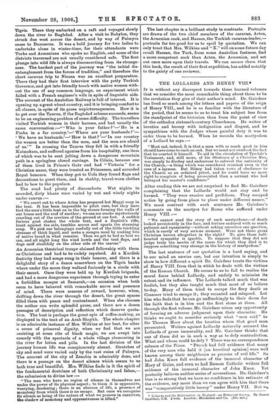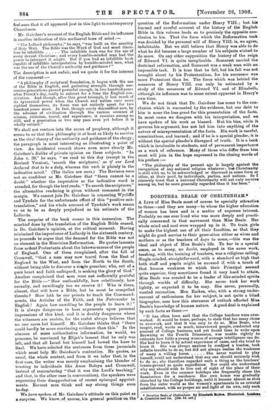THE LOLLARDS AND HENRY VIII.* IT is without any disrespect
towards these learned volumes that we consider the most remarkable thing about them to be the revelation they give of their author's mind. Dr. Gairdner has lived so much among the letters and papers of the reign of Henry VIII., and he is so familiar with the literature of the period, that he seems to us to treat his subject less from the standpoint of the historian than from the point of view of the orthodox sixteenth-century Churchman. He writes of heretics and heresy with indignation and disgust, and he sympathises with the Judges whose painful duty it was to order them to be burned. When he records the martyrdom of a Lollard he says :—
"Most sad, indeed, It is that a man with so much good in him should have come to such an end. But we must not overlook the fact that he courted it himself. To aid in the circulation of Tyndale's Testament, and, still more, of his Obedience of a Christian Man, was simply to disobey and endeavour to subvert the authority of the Church,—a thing which was considered criminal even in the case of a layman. But Bilney had taken vows of obedience to the Church as an ordained priest, and be could have no moro right to complain of being prosecuted than a servant who had betrayed his master's confidence."
After reading this we are not surprised to find Mr. Gairdner complaining that the Lollards would not stay and be burned. " They were evasive and perfidious. They escaped notice by going from place to place under different names."
We must contrast with such sentences Mr. Gairdner's comments on the martyrs for Rome who suffered under Henry VIM:—
" We cannot read the story of such martyrdoms—of death looked persistently in the face, and torture endured with so much patience and equanimity—without asking ourselves one question, which is surely of very serious moment. Were not these groat Christian heroes altogether in the right? To give them half- hearted sympathy is ignoble. To suppose that they did not judge truly the merits of the cause for which they died is to suppose something very strange in the history of martyrdom."
The last sentence of our quotation is a hard saying, and to our mind an unwise one, but our intention is simply to show in how different a spirit Dr. Gairdner treats the victims of Henry VIII. from that in which he deals with the victims of the Roman Church. He seems to us to fail to realise the moral force behind Lollardy, and unduly to minimise its extent and its influence. The Lollards talked much that was foolish, but they also taught much that most of us believe to-day. Many of them tried to escape the fiery death as Cranmer tried to escape it ; they recanted and relapsed. Let him who feels that he can go unflinchingly to their doom for the faith that is in him cast the first stone at them. All through the first volume Mr. Gairdner seizes any opportunity of forming an adverse judgment upon their character. He thinks we ought to consider seriously what "men said" to Sir Thomas More about the heretics whom that good man persecuted. Writers against Lollardy naturally accused the Lollards of gross immorality, and Mr. Gairdner thinks that one of them did so in such a way as to defy contradiction. What and whom could he defy P There was no correspondence column of the Times. " P ecock bad full evidence that many of the very men who held it [an heretical opinion] were well known among their neighbours as persons of evil life." So had John Knox full evidence of the immoral character of Mary of Guise, and even so had Roman Catholic writers full evidence of the immoral character of John Knox. Yet posterity believes neither series of accusations. Dr. Gairdner's bias is so strong that we have no confidence in his estimate of
the evidence, any more than we can agree with him that there was "comparatively little heresy" under Henry VII. But we • Lollardy and the Reformation in England: an Historical Survey. By James Gairdner, C.B. 2 vols. London: Macmillan and Co. [Si., net.]
feel sure that it all appeared just in this light to contemporary Churchmen.
Mr. Gairdner's account of the English Bible and its influence
is another indication of this mediaeval tone of mind •
"The Lollard philosophy," he says, "was built on the sanctity of Holy Writ., The Bible was the!Word of God and must there- fore be infallible The infallible book, was for, the use of every devout, Christian ; and every humble-minded_ man had the power to interpret it aright. But if you had an infallible book capable of infallible • interpretation by humble-minded 'men, what was the use of the Church's authority and guidance P"
The description is not unfair, and we quote it for the interest of the comment :—
"A philosophy of scriptural foundation, it began with the use of the Bible in English, and gathering strength through suc- cessive generations proved powerful enough, in two hund red years after Pecock's day, really to subvert for a time the English con- stitution. And though; after this great triumph, it lost much of its tyrannical power- when the Church and nation once more righted themselves, its force was not 'entirely spent for two hundred years more.. In fact, though sorely discomfited now, by the advance of. civilisation through the various avenues of science, criticism, travel, and experience, it remains among us still, and a generation or two may pass even -yet before it is wholly extinct."
We shall not venture into the arena of prophecy, although it Seems to us that this philosophy is at-least as likely to survive as the rival- theory of the authority and guidance of the clergy ;- the paragraph is most interesting as illustrating 'a point Of view. An incidental retinal shows even more clearly Mr.
Gairdner's dislike of private Opinion on these *subjects. " In John v. 39," he says, " we read to this day (except in the
Revised. Version), 'search the scriptures,' as if our Lord declared that to be a 'duty, whereas the verb is plainlyin the indicative mood." (The italics are ours.) The Revisers were
not so confident as Mr. Gairdner that "there cannot be a doubt" whether the imperative or the indicative word is ntended, for though the text reads, " Ye search the scriptures," the alternative rendering is given without comment in the margin. We cannot join Dr. Gairdner in censuring Wycliffe and Tyndale for the unfortunate effect of this "positive mis- translation," and his whole account of Tyndale's work seems to us to be as deeply prejudiced as his estimate of the Lollards.
The surprise of the book comes in this connexion. The
mischief done by the translation of the English Bible ceased, in Dr. Gairdner's opinion, at the critical moment. Having minimised• the importance of Lollardy in the sixteenth century, he proceeds to argue that the demand for the Bible was not an element in the Henrician Reformation. He quotes laments from ardent Protestants about the lukewarmness of the people of England. One of them complained, after the fall of Cromwell, "that a man may now travel from the East of England to the West, and from the North to the South, with-out being able to discover a single preacher, who, out of a puieheart 'and faith unfeigned, is seeking the glory of God."
Another complained that men were not sufficiently grateful for the Bible :—" How untliankfully, how rebelliously, how
carnally, and unwillingly too we receive it! Who is there, almost, that will have a Bible, but be must be compelled thereto P How loth be our priests to teach the Command- ments, the Articles • of the Faith, and the Paternoster in English ! Again how unwilling be the people to learn it! " It is always dangerous to base arguments upon personal impreasions of this kind, and it is doubly dangerous where the witnesses are zealots, for the zealot always believes that uo one cares but himself. Mr. Gairdner thinks that " there could hardly be more convincing evidence than this." In the absence of more authoritative information, he would, we presume, be convinced by Elijah's lament that he only was left, and that all Israel but himself had bowed the knee to Baal. We have selected the sentences from these jeremiads which most help Mr. Gairduer's contention. He quotes, as usual, the whole context, and from it we infer that, in the first case, the writer was merely emphasising the blunder of trusting to individuals like Anne Boleyn and Cromwell, instead of remembering "that it was the Lord's teaching,"
and that, in the other case (a conversation), the speakers were expressing their disapprobation of recent episcopal appoint-. meats. Earnest men think and say strong things even to-day.
• We .have spoken of Mr. Gairdner's attitude on this point as a surprise. We know, of course, his general pasition'on the'
question of the Reformation. under Henry VIII. ; but: his learned and careful account of the history of the English
Bible in this volume leads us to precisely the opposite con- clusion to his. That the form which Abe .Reformation took. was decided. by the personal will of- Henry.VIII. is, we agree, indubitable. But we still believe that Henry was able to do what he did.because a large number of his subjects wished to do more. On any other supposition the history of the reign of Edward VI. is quite inexplicable. _ Somerset carried the. doctrinal reformation, and Somerset was a weak man with an • impossible task. It is true that he fell, but his fall was not brought about by his Protestantism, for his successor was more Protestant than he. The force which was behind the measures of Henry .VIIL can only be estimated by a , study of the measures of Edward VI. and. of Elizabeth,.
although its influence was to some extent apparent in Henry's own Eine.
We do not think that Dr. .Gairdner. has come .to the con- clusion which . is warranted by. the evidence, but our debt to bins is none the.less great for this presentation of the facts. In most cases we disagree with his interpretation, and we.
have spoken of. his work as biassed. But his bias, while it governs his argument, has not led him into anything of the nature-of misrepresentation of .the.facts. His work is careful, conscientious, and learned.; and if he is a special pleader, it is without the special pleader's disregard of; truth. It is a book . which.is invaluable.to students, and of permanent importance as a work of reference. Many of those who differ from him .
most will join in the hope. expressed in the closing words of his. preface :—
"The philosophy of the present age - is largely against the. recognition of any national religion whatever ; but Christianity . is still with us, to be acknowledged or disowned in some form or , 'other, at their peril, by individuals, parties, and nations. So I sincerely trust that a national Christianity will not only survive- among us, but be more generally regarded than it has been." -



















































 Previous page
Previous page